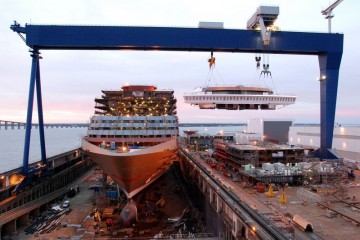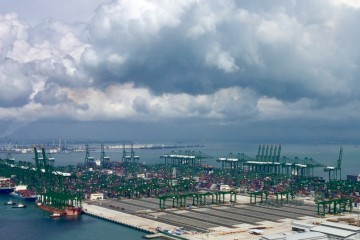Last month was not a particularly good month for Maersk. It lost millions of dollars, got a downgrade from rating agencies, but possibly more important, it was haunted by scandals related to the scrapping of its old ships. Long considered shipping’s leader in corporate social responsibility, the emperor suddenly seemed to have no cloths. But more than a story on the behaviour of one shipping company, the ship scrapping scandal is illustrative of attempts to regulate any negative effect of shipping.
Why scrap ships?
Ship are scrapped to recuperate parts and steel that could be recycled, so scrapping is a source of revenue for ship owners. The scrapping of ships is also referred to as ship dismantling, demolition, breaking or recycling. The large majority of ships is demolished in India, Bangladesh and Pakistan, mostly by grounding ships on beaches and dismantling them there; a method called beaching. This method is cheap, but dangerous and polluting. The financial stakes are high: the difference between scrapping in South Asia and scrapping in places like China or Turkey – that have higher safety and environmental standards – could amount to 2 million US dollars per ship.
In the current times of overcapacity, a lot of ships will be scrapped. So a lot of money can be earned by being not very picky on environmental, social and safety standards.
What is the scandal?
Maersk has been accused of three different things:
- illegally sending a floating oil production and storage tanker likely containing toxic residues to a scrapyard in Bangladesh;
- putting pressure on a company from which it charters ships to send old ships to one of the most sub-standard scrapping yards in a period in which it publicly opposed beaching;
- not living up to its own ambitions with regards to improving a yard in Alang (India) it uses.
Maersk – kind of – admitted things were wrong in the first two instances. As for the third accusation, they confirmed their commitment to improve the yard in Alang, without being specifically addressing the points brought forward by the journalists.
Not good for Maersk. A lot of the trust that was built over the last years was destroyed in one month. Its profile looks less cool and considerate now. Not without irony, its competitor Hapag Lloyd announced in the same month that it will remain committed to its non-beaching policy. A subtle hint as to who has taken over as container shipping’s most responsible firm. But beyond these rivalries, the scandals also raise the question: if Maersk is not able to live up to its own motto of constant caring, who else is shipping is? Maersk is an attractive high-profile target for investigative journalism, but what about many other shipping companies that are without doubt much more careless?
It is the system, stupid
At the root of all this is the same system that makes it so difficult to regulate any negative externality from shipping.
To start with, getting global regulation for shipping in place takes a lot of time. There is the Hong Kong Convention for the Safe and Environmentally Sound Recycling of Ships, but only a handful of countries have actually ratified it since it was adopted in 2009.
This slowness has provoked the EU to take its own measures. An EU ship recycling regulation in force since 2013. The idea behind this regulation is that EU-flagged ships would have to scrap their ship in a yard that is on an EU white list. This list is currently being made and is expected to be available by the end of this year.
A lot of this regulation depends on the willingness of flag states to enforce. A majority of ships flies a flag of convenience, a disingenuous way to evade taxes and cumbersome rules. Ships sent to scrap are generally flagged out to such flags of convenience for their last voyage. There is even a whole sub-sector that facilitates this evasion, the industry of the cash-buyers, companies that buy old ships from shipowners and sell them to scrapping yards. So, it is an illusion to think that these flags states will enforce regulation on ship recycling; the raison d’être of a large share of them is not to bother shipowners. The Hong Kong Convention is symbolic, so has understandably large support among the actors that should normally be annoyed by it: the shipowners and cash-buyers. The game that shipping’s representatives seem to be playing is lobbying countries to ratify the Hong Kong Convention so that they can pretend things are moving. You will see, the next thing will be a ratification by India…
The same flaw also hinders the EU regulation; It applies to EU-flagged vessels, so shipowners will simply flag out before sending their ship to whatever sub-standard facility. In fact, earlier this year Maersk already threatened to flag out if its Alang yard would not be on the EU white list.
How to get out of this conundrum?
What is rare about this story is that it came out. Journalists invested time in disclosing some of shipping’s dirty secrets. NGO’s like the Shipbreaking Platform left no opportunity unused to hammer the message home. Major shareholders of Maersk openly criticised Maersk’s behaviour. Investigative press, relentless civil society organisations and critical shareholders; shipping has been sheltered from these and has had difficulties to deal with these, but these forces are necessary to make shipping more responsible – and more desirable again.
But it is not enough. The lingua franca of shipping – and possibly the only language it understands – is money. There needs to be a financial incentive to stimulate responsible behaviour.
As it happens, an excellent report has recently been published that assesses different financial instruments that could be used to stimulate responsible ship recycling. The preference of the researchers is a ship recycling license for ships calling European ports. The idea is simple: every year each ship pays a contribution for this license – and at the end of the life-cycle the cumulated contributions will be given back to the shipowner if he decides to demolish this ship in a white-listed ship recycling facility. If he does not, he will not get his contributions back. So, a financial incentive to behave well. This would be required for all flags, so flagging out would not help this time.
If ever a regulator were to be serious about stimulating responsible ship recycling, this is the place to look: one of the few measures currently available that could bring ship recycling into the 21st century.
2 Comments
Comments are closed.




Dear Olaf,
Thanks again for you valuable input a couple of years back and further dialogue regarding our enabling trade work. I remember you took a positive interest in what we did and I can assure you that we work as seriously with the shipbreaking project in Alang. If you would take contact I would be more than happy to provide you with our side of the story as we really beleive we contributing substantially to the right development on shiprecycling.
Best regards,
John Kornerup Bang
Maersk
A very insightfull article, i enjoyed reading it very much .. thank you